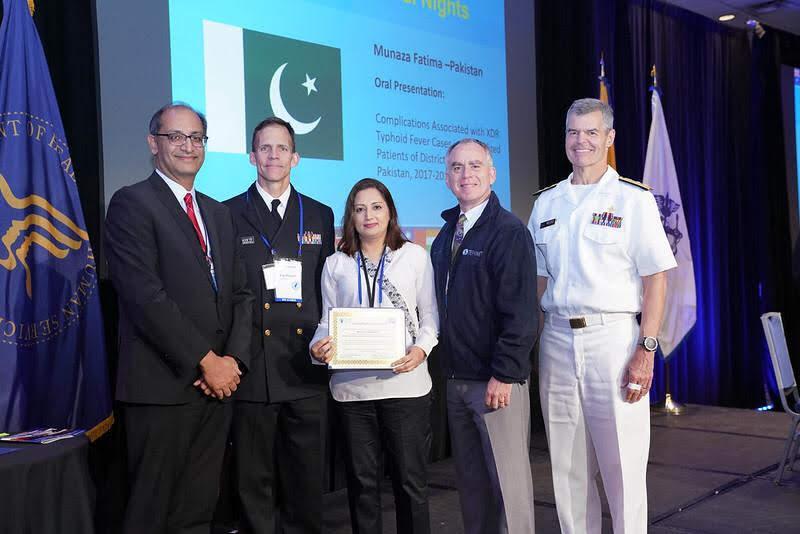From FELTP Trainee to N-STOP Officer: The Career Path of a Recent FELTP Graduate
Dr. Fatima Munaza is a Data Usage and Risk Assessment Officer in Pakistan’s National Stop Transmission of Polio (N-STOP) program based in Karachi. In 2019, she graduated from the Pakistan Field Epidemiology and Laboratory Training Program (FELTP). We asked Dr. Munaza how her FELTP training has added value to her career as an epidemiologist.
I’m a dentist. I have a bachelor’s degree from Liaquat University of Medical and Health Sciences and a master’s degree in Public Health Dentistry from Isra University, a public sector medical university in Hyderabad.
Putting My FELTP Training to Use in Pakistan

Dr. Munaza accepting the award for best oral presentation from an FETP resident. EIS International Nights, April 2019, Atlanta. (From left to right: Kashef Ijaz, Former DGHP Principal Deputy Director; Kip Baggett, WIDB Branch Chief; Fatima Munaza, Pakistan-FELTP graduate; Patrick O’Carroll, Director of Health Systems Strengthening at the Task Force for Global Health; Stephen Redd, Deputy Director for Public Health Service and Implementation Science.
I knew early in my training that I wanted to serve in public health. The Pakistan FELTP is well-known, so when they asked for new recruits, I was eager to apply. I knew the program would offer excellent training in applied epidemiology and would be great for my career. In 2017, I entered the FELTP. I was excited to become one of the more than 200 epidemiologists trained through the program since 2006. I was really proud to be part of an organization whose residents and graduates add so much value, particularly in field work.
Overcoming Challenges During the Outbreak Response
As a resident, I investigated several outbreaks, including measles (March 2018), extensively drug-resistant (XDR) typhoid (October 2017 to October 2018), and HIV (April 2019). While the work was very rewarding and taught me a lot, it also included a few challenges. For example, when people did not want to be interviewed, it was at times quite difficult to get the data I needed. I was able to resolve this issue by assuring those involved that their replies would remain confidential. Many people were reluctant to get vaccinated during the typhoid outbreak. However, I was able to help people overcome their fears and gain their trust by being open, honest, and straightforward about the benefits of vaccinating the community. In addition, there were environmental challenges that made our work enormously difficult, including working in extreme heat (125°F) and traveling to very hard-to-reach places. Finally, some of the response areas were unsafe, requiring a security detail. Fortunately, I felt well-prepared to deal with all these challenges. The FELTP trained me, not only in the science of conducting outbreak investigations, but also in the art of delivering messages to communities. This training helped me meet many of the challenges we faced.
FELTP Impact in Pakistan: Enhanced Surveillance and Laboratory Services
I conducted meaningful work with FELTP. The typhoid outbreak investigation resulted in:
- A public health awareness campaign for timely case reporting
- Enhanced laboratory services guiding antibiotic use
- Improved water and sanitation
- A vaccination campaign
With the support and guidance of my FETP mentors, I created a presentation about the outbreak called “Morbidity and Mortality Associated with Typhoid Fever among Hospitalized Patients, District Hyderabad, Pakistan, 2017-2018.” In April, 2019, I was awarded best oral presentation during the Epidemic Intelligence Service (EIS) International Nights.
Last July, I became a Data Usage and Risk Assessment Officer in Pakistan’s National Stop Transmission of Polio (N-STOP) program in Karachi. Here, I apply all the skills I learned in FELTP. This includes developing plans with evidence-based decision-making strategies, as well as conducting data analyses, quality assessments, and appropriate validation. This work has led to improved surveillance reporting. FETLP has had a direct impact on my career. Through education and mentorship, I learned the skills needed to move into my professional roles. As a resident, the most exciting part of FETP is being a disease detective, quickly conducting investigations, and applying evidence-based actions and responses. The results are fulfilling and make all the hard work and effort worthwhile. I also feel proud to be able to serve these communities.
My advice to someone considering joining any Field Epidemiology Training Program is to apply! It’s a very unique public health training program that builds the necessary skills for action-oriented policy recommendations grounded in scientific evidence. It also provides many career opportunities in field epidemiology.
